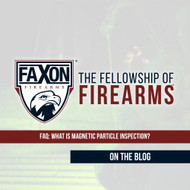FAQ: What is Magnetic Particle Inspection
Posted by Faxon Firearms Staff on May 24th 2023
What is Magnetic Particle Inspection
The barrel is a critical part in firearm performance and safety. To ensure their reliability, it is essential to implement rigorous quality control measures during manufacturing and regular inspections throughout their lifespan. One such inspection method is Magnetic Particle Inspection (MPI). In this blog post, we will explore why MPI is vital for rifle barrels and provide an overview of this non-destructive testing technique.
What is Magnetic Particle Inspection? Magnetic Particle Inspection, often abbreviated to MPI, is a specialized inspection method used to detect surface and near-surface defects in ferromagnetic materials (in our case 4150 CMV and 416-R Stainless Steel). It involves applying a magnetic field to the material and introducing ferromagnetic particles that align themselves along areas of magnetic flux leakage caused by defects. These particles create visible indications of otherwise invisible flaws or defects, which can be examined to determine the placement, nature, and severity of any flaws.
Why is MPI Important for Rifle Barrels?
- Ensuring Safety: Safety is paramount when it comes to firearms. By performing MPI on rifle barrels, manufacturers can identify surface defects, such as cracks or flaws, which might compromise the structural integrity of the barrel. Detecting these defects early on helps prevent catastrophic failures, such as barrel bursts or ruptures, which can lead to accidents, injuries, or even loss of life.
- Quality Control in Manufacturing: During the manufacturing process, MPI acts as a vital quality control tool for rifle barrels. By inspecting the barrels before they are finished and assembled into complete firearms, manufacturers can ensure that only barrels free from defects are used. This ensures consistent quality, reliability, and longevity of the end product.
- Compliance with Safety Standards: The firearms industry adheres to stringent safety standards and regulations. Conducting MPI on rifle barrels demonstrates a commitment to meet these standards. By implementing MPI inspections, manufacturers show that they prioritize safety and are taking necessary measures to ensure the integrity of their products.
- Enhancing Durability and Longevity: Rifle barrels are subjected to significant pressure and stress during firing. Hidden defects within the barrel can lead to premature failures or accuracy issues. MPI allows manufacturers to identify and eliminate defects that would otherwise go unseen. This helps enhance the durability and accuracy potential of rifle barrels, ensuring they can withstand repeated use and maintain their structural integrity.
Magnetic Particle Inspection plays a vital role in ensuring the safety, quality, and reliability of rifle barrels. By detecting surface defects, preventing catastrophic failures, complying with industry standards, and enhancing durability, MPI helps maintain the integrity of rifle barrels throughout their lifespan. It provides peace of mind to manufacturers, firearms enthusiasts, and anyone relying on the safe and effective operation of firearms.
At Faxon Firearms, we take quality and safety seriously. As part of our commitment to quality control and safety, Faxon Firearms performs MPI in-house at our Cincinnati, Ohio facility. By conducting MPI inspections on rifle barrels directly within our manufacturing process, Faxon Firearms ensures that our products meet the highest standards of safety and reliability.
With Faxon Firearms' dedication to utilizing advanced inspection techniques like MPI, customers can trust that our rifle barrels undergo thorough scrutiny and meticulous testing. The implementation of MPI at our facility ensures our barrels meet the highest standards of our customers.
As technology and inspection methods continue to advance, MPI remains an indispensable tool in the pursuit of firearm safety and excellence.MPI plays a crucial role in upholding the highest standards in the firearms industry, ensuring that rifle barrels are of the utmost quality, performance, and safety.

